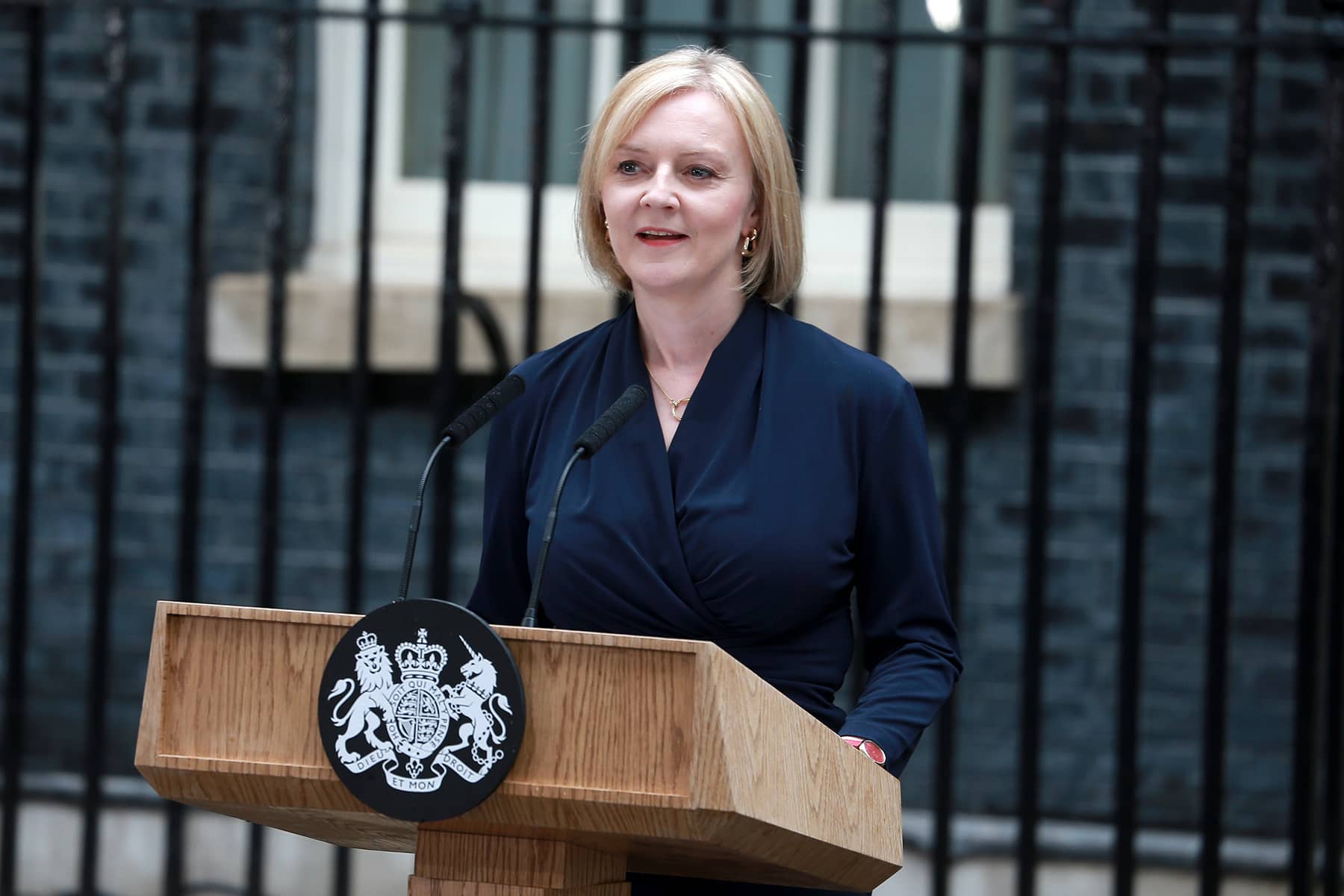
British prime minister Liz Truss resigned on October 20, after just 44 days in office. Modeling herself on Prime Minister Margaret Thatcher, who pushed the same sorts of supply-side economic policies U.S. president Ronald Reagan did, Truss had taken office on September 6 promising to fix the country’s rising cost of living by slashing taxes on the country’s corporations and highest earners and thereby, she argued, spurring growth.
Queen Elizabeth II died just two days later, putting the country into a period of mourning, but on September 23, Kwasi Kwarteng, Truss’s chancellor of the exchequer — Britain’s finance minister — announced the promised tax cuts without suggesting any way to pay for them. The value of the British pound plummeted, and on October 14, Truss forced Kwarteng to resign and walked back the tax cuts.
Truss’s own power became so precarious that on October 14, the Daily Star tabloid set up a live feed featuring a head of iceberg lettuce next to a portrait of Truss, asking, “Which wet lettuce will last longer?”
Resignations from the government continued, and then a badly botched vote in Parliament on October 19 created such chaos and anger that it appeared Truss could not recover. She resigned less than 24-hours later. The Conservative Party will pick a new leader by October 28.
The lettuce celebrated its victory with disco lights. “After an unbeleafable campaign I am thrilled to have been crowned victorious in these chard times,” it said tonight on a voice-over. “However we must romaine cautious. This is just the tip of the iceberg.”
Although the sentiment came from a leafy green vegetable, it is not wrong that Truss’s resignation is the tip of the iceberg. On September 23, Larry Kudlow of Fox Business on the Fox News Channel said: “The new British prime minister, Liz Truss, has laid out a terrific supply-side economic growth plan which looks a lot like the basic thrust of Kevin McCarthy’s Commitment to America plan.”
Today’s MAGA Republicans are indeed doubling down on dramatic tax cuts, and we now have an illustration of just how that might pan out.
Moreover, many observers see in the Truss debacle a condemnation of the isolationist nationalism of the past decade. This crisis, they say, has been sparked by the 2016 decision of voters in the United Kingdom to withdraw from the European Union, to which it had belonged since 1973, a move dubbed “Brexit,” for “Britain” and “exit.” That decision reflected, in part, the economic doldrums in the country after the 2008 crash, and the emphasis of politicians on anti-immigrant sentiment and promises to return England to a past greatness by cutting it off from the bureaucrats of Europe.
But the reality of Brexit, accomplished only in January 2020, was an economic hit worse than that from the coronavirus pandemic. Britain’s instability has also weakened the European Union, making it harder for Europe and the North Atlantic Treaty Organization (NATO) to stand against Russian president Vladimir Putin.
Foreign observers have blamed Brexit for the instability in the U.K., although many recognized that economic issues after 2008 — and, some argued, even before then — had been behind the Brexit vote itself. Writing in France’s newspaper Le Monde, Sylvain Kahn said, “Since the referendum, British governments have demonstrated, with ever greater talent, that Brexit only takes the UK further away from the promised land of recovered sovereignty and untrammelled freedom. ‘Take back control!’ they all said. But the British are a very long way from doing that. No other EU member is in such a state…. Since Brexit, Britain’s Conservative leaders have worked tirelessly to prove that EU membership was very far from the problem.”
This same anti-immigrant, nationalist isolationism fed the rise of the MAGA Republicans. They joined with the supply-siders to create today’s Republican Party, and today’s illustration that their ideology cannot survive contact with reality sparked an astonishing leap to the right.
In The Federalist, senior editor John Daniel Davidson announced, “We Need To Stop Calling Ourselves Conservatives.” “The conservative project has failed,” he wrote, “and conservatives need to forge a new political identity that reflects our revolutionary moment.” Western civilization is dying, he wrote, and to revive it, those on the right should “start thinking of themselves as radicals, restorationists, and counterrevolutionaries. Indeed, that is what they are, whether they embrace those labels or not.”
They should, he said, stop focusing on the free-market economics and supply-side principles of the Reagan years and instead embrace the idea of wielding government power as “an instrument of renewal in American life … a blunt instrument indeed.”
Davidson embraces using the power of the government to enforce the principles of the right wing, bending corporations to their will, starving universities that spread “poisonous ideologies,” getting rid of no-fault divorce, and subsidizing families with children. “Wielding government power,” he writes, “will mean a dramatic expansion of the criminal code.” Abortion is murder and should be treated as such, parents who take their children to drag shows “should be arrested and charged with child abuse,” doctors who engage in gender-affirming interventions “should be thrown in prison and have their medical licenses revoked,” “teachers who expose their students to sexually explicit material should not just be fired but be criminally prosecuted.”
“The necessary task is nothing less than radical and revolutionary,” he writes. And for those worrying that the assumption of such power might be dangerous, “we should attend to it with care after we have won the war.”
What Davidson is suggesting, of course, is indeed radical: it has most of the hallmarks of fascism. Other Republican lawmakers are also embracing that ideology lately: Florida state representative Anthony Sabatini approvingly quoted Spanish fascist dictator Francisco Franco, saying, “I answer only to God and to History.”
But more and more, Americans seem to be moving back toward the principles of Abraham Lincoln, who stood firm on the idea that true conservatism was defending the idea, enshrined in the Declaration of Independence, that all people are created equal and have a right to consent to the government under which they live.
In Oklahoma on October 20, for the first time in decades, the Tulsa World endorsed a Democrat, U.S. Representative Kendra Horn, rather than extremist Republican Markwayne Mullin, for the U.S. Senate. The paper applauded Horn’s bipartisanship and willingness to meet with her constituents. “Her congressional stint gives Oklahomans a glimpse of what Oklahoma lawmakers of the past looked like,” the paper wrote. “They were pragmatic legislators who looked after their state and found ways to get things done rather than cater to the fringes of their own parties…. In this moment, this is the type of senator we need.”
Frеd Duvаl
Letters from an Аmerican is a daily email newsletter written by Heather Cox Richardson, about the history behind today’s politics














